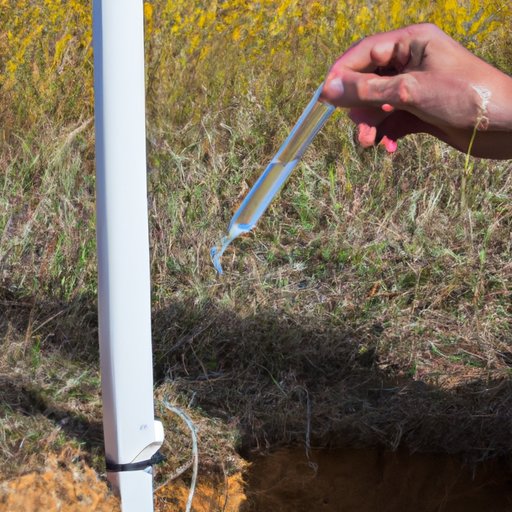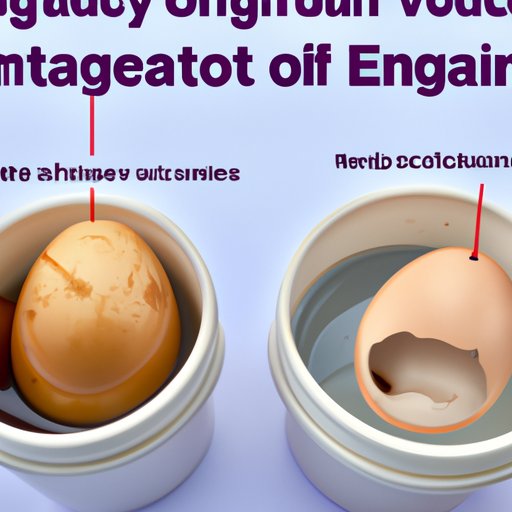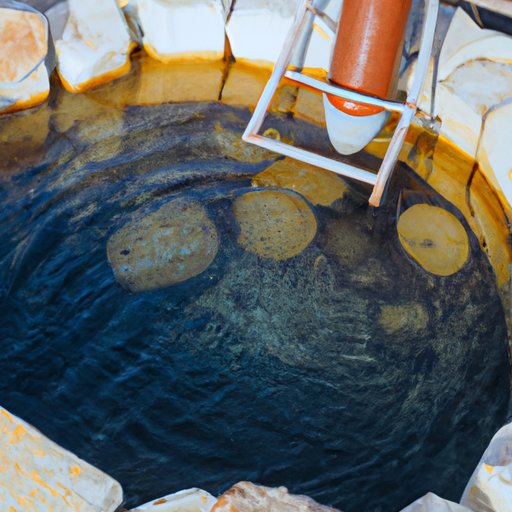Introduction
Well water is an essential source of drinking water for many households. Unfortunately, well water can sometimes have a distinct rotten egg smell that may make it difficult or unpleasant to drink. This article will explore why well water can smell like rotten eggs and what can be done to address the issue.
Examining the Causes of Rotten Egg Smell in Well Water
The rotten egg smell in well water is usually caused by the presence of hydrogen sulfide gas, which is formed when bacteria breaks down organic matter in the absence of oxygen. This process occurs naturally in groundwater and is often found in wells that are not properly sealed or lined. The hydrogen sulfide gas then rises up through the water supply and produces the distinctive odor.
The role of bacteria in producing the rotten egg odor cannot be overlooked. Certain types of bacteria, such as Desulfovibrio desulfuricans, thrive in anaerobic conditions and produce sulfur compounds as they break down organic matter. These sulfur compounds are responsible for the smelly odor, and their presence can indicate the presence of other contaminants such as heavy metals.

Investigating the Effects of Hydrogen Sulfide on Well Water Quality
Hydrogen sulfide is more than just a smelly nuisance; it can also cause serious damage to plumbing fixtures and pipes. The gas is highly corrosive and can cause metal pipes to corrode and eventually fail. It can also discolor the water, causing it to turn yellow, brown, or black.
Additionally, hydrogen sulfide can interact with other chemicals present in the water, such as iron, manganese, and zinc, to create additional odors and tastes. This can make the water unsuitable for drinking and other uses.

How to Remove the Rotten Egg Smell from Well Water
The good news is that there are treatments available to remove the rotten egg smell from well water. The most common treatment is aeration, which involves injecting air into the water to oxidize the hydrogen sulfide and convert it into harmless sulfur particles. Other treatments include activated carbon filtration, chlorination, and reverse osmosis.
These treatments do require some maintenance to ensure that they continue to work effectively. Aeration units need to be cleaned regularly to prevent clogging, while carbon filters need to be replaced every 6-12 months. Chlorine needs to be monitored and adjusted as needed, and reverse osmosis filters need to be replaced every 2-3 years.
Exploring the Health Risks Associated with Rotten Egg Smelling Well Water
In addition to being unpleasant to drink, rotten egg smelling well water can also pose health risks. The presence of hydrogen sulfide in the water can lead to the ingestion of contaminants that can cause gastrointestinal distress. Long-term exposure to hydrogen sulfide can also increase the risk of developing certain respiratory illnesses.
It is important to note that the health risks associated with hydrogen sulfide depend on the level of concentration in the water. Low levels of hydrogen sulfide are generally considered safe, but high levels can be dangerous and should be addressed immediately.

Understanding the Cost and Maintenance Requirements of Treating Rotten Egg Smelling Well Water
Treating well water for the rotten egg smell can be costly, especially if you need to install a new system. The cost of the equipment and installation can range from a few hundred dollars to several thousand depending on the type of treatment used. Additionally, there are ongoing costs for maintenance, replacement parts, and water testing.
However, these costs are often worth it to ensure that your well water is safe and free of unpleasant odors. Properly maintained treatment systems can help to reduce the risk of contamination and improve the taste and smell of your water.
Conclusion
Rotten egg smelling well water can be a sign of contamination and should be addressed immediately. The cause of the smell is usually due to the presence of hydrogen sulfide gas, which can be removed with the help of treatments such as aeration and activated carbon filtration. These treatments come with a cost, but they can help to ensure that your well water is safe and free of unpleasant odors.
If you find that your well water has a rotten egg smell, it is important to take action right away. You should contact a qualified water treatment professional to assess your water and recommend the best course of action for addressing the issue.
(Note: Is this article not meeting your expectations? Do you have knowledge or insights to share? Unlock new opportunities and expand your reach by joining our authors team. Click Registration to join us and share your expertise with our readers.)
